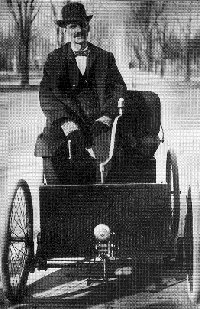Think of this as Volume 14, Number 7 of A-Clue.com, the online newsletter I've written since 1997. Enjoy.
 The cycles of American history are important because they can show us where we are, and let us know that our reactions to events are not as unique as they appear.
The cycles of American history are important because they can show us where we are, and let us know that our reactions to events are not as unique as they appear.
Our history has been marked, so far, by six generational crises from which we managed to escape, and which defined all who went through them:
- The 1800 Crisis, about the limits of our democracy and adherence to those limits.
- The 1828 Crisis, a new balance between sections and the myth of "the people."
- The 1860 Crisis, about Union, slavery, and the nature of our economy.
- The 1896 Crisis, about balancing power between business and government.
- The 1932 Crisis, about rescuing the economy and unity.
- The 1968 Crisis, about culture, global war, and values.
The 2008 Crisis has much in common with the 1896 and 1932 crises, in that our problems are primarily economic. But it also has much in common with 1860 and 1968, in that our people seem culturally divided. (History is viewed like a picture on Google Earth — everything below appears compressed and one-dimensional.)
There should no longer be doubt that 2008 was important, in the same way that our other crisis years were important. The assumptions of the past era had collapsed, our problems seemed ready to bury us, and we were ready to hear a new story about ourselves.
But we are now two years past that crisis. We have reached its center, its core. We are in the middle of cultural, economic and literal war, a time that tries mens' souls and has people wondering aloud whether this path is, indeed the right one.
Now is the time for heroes.
 In 1898, there were many heroes. But what I learned from David Traxel's book was that the most important ones were not the people in the newspapers.
In 1898, there were many heroes. But what I learned from David Traxel's book was that the most important ones were not the people in the newspapers.
Teddy Roosevelt, of course, was all over the papers. After McKinley's assassination he would define the coming Progressive Era, one marked by slow, steady change, a constant, evolving, and sometimes successful battle for higher living standards against the backdrop of unbridled capitalism and industrialization.
But Roosevelt's personal myth-making was, in retrospect, like the foil covering a chocolate Valentine. The important changes were happening under the surface. Mass production, mass consumption, mass media. Brands. The very concept of a suburb. All these were brand new at the time, and the people who made them happen were the real heroes of the age.
Something similar is happening today. A lot of attention is on the President, and since political reporters can't see anything but what is in front of them, they assume his struggles are the story of our time.
They're not. He is merely a symbol of them.
 The real struggles are happening within our economy, and the real heroes are those who are creating true economic change. Mass customization. Massively scaled computing, available from anywhere. New types of energy, and a new energy economy.
The real struggles are happening within our economy, and the real heroes are those who are creating true economic change. Mass customization. Massively scaled computing, available from anywhere. New types of energy, and a new energy economy.
Google is the U.S. Steel of our time. It's symbolic of much deeper forces, forces of which it's part of, and a product of, but forces that go far beyond itself. U.S. Steel epitomized the idea of scaled manufacturing. Google epitomizes the idea of scaled Internet infrastructure. It's no longer about the PC in front of you, but what it can connect with, and what you can gain from that connection. Just as U.S. Steel wasn't so much about steel, as about what you could do with it.
In 1898, Henry Ford (left) was running a start-up. No one knew he would dominate the coming age. Roosevelt himself went from his boat to Sagamore Hill by bicycle. The new energy economy is in a similar place. Its Exxon and Mobil are still unknown. We only know it won't be Exxon or Mobil, because the way in which new energy will be made, stored, and used will require a different infrastructure, one as foreign to Houston as Columbus was to the Indians.
I am privileged to be in on the media story. After many fits-and-starts publishers have finally figured out how to make money here, and how to organize a business around it. These new methods have not yet been driven-down into the grassroots — they are still a national activity — but they will go there. Online innovation has just begun.
My point is, I guess, that this is an exciting time, but not in the way you think. You may be looking at the headlines and thinking 2010 is a story of Great Men (and Women) strutting and fretting their hour on history's stage. But it's not that at all.
It's about you. It's about what you can do with this world my generation has made. It's about your ability to invent, and re-invent the rest of us in the process. It's about using information as a raw material and squeezing it into diamonds, turning it into new kinds of steel, building new media markets with it.
The story of our time is on the screen in front of you, and in your own mind. America needs heroes. You have the opportunity to be one, by building a new age.









